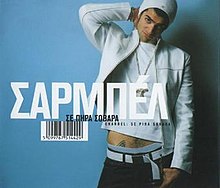| This article needs additional citations for verification. Please help improve this article by adding citations to reliable sources. Unsourced material may be challenged and removed. Find sources: "Sidi Mansour" song – news · newspapers · books · scholar · JSTOR (May 2017) (Learn how and when to remove this message) |
| "Sidi Mansour" | |
|---|---|
| Traditional Tunisia folk song | |
| Native name | سيدي منصور |
| Language | Tunisian |
| Music video | |
| "Sidi Mansour" on YouTube | |
"Sidi Mansour" (in Tunisian dialect "سيدي منصور" ) is a popular folkloric song from Tunisia.
Over the past few decades, various renditions of the song have been created. The song was made famous in 2000 when the Tunisian artist Saber Rebaï (in Tunisian صابر الرباعي) released his version. Since then, "Sidi Mansour" has been subject to many covers in Arabic and many other languages. In 2021, Enisa Nikaj, a Brooklyn-born American singer of Albanian descent, released the song "Count My Blessings", inspired by the song. Boney M.'s "Ma Baker" was also inspired by the folk song.
Rebaï's "Sidi Mansour" song should not, however, be confused with the unrelated "Sidi Mansour" by Algerian raï artist Cheikha Rimitti.
History
Numerous variants of the song exist with similar lyrics dating back hundreds of years. The song is dedicated to the Tunisian Sufi saint Sidi Mansour, whose name was Mansour Ghulam, and lived prior to the 15th century. He was a native of the city Sfax, where his tomb is. The city quarter is also named after him.
Versions prior to Saber Rebaï
The song was recorded by Mohammed Jarrari (in Arabic محمّد الجراري) in his audio cassette Folklore tunisien (in Arabic فولكلور تونسي ) as "Sidi Mansour Baba Bahri" (in Arabic سيدي منصور بابا بحري).
A version was recorded in 1975 by Mohamed Hanesh (in Arabic محمد الحنش).
Saber Rebaï version
| "سيدي منصور" | |
|---|---|
| Single by Saber Rebaï | |
| from the album Sidi Mansour | |
| Language | Arabic |
| English title | "Sidi Mansour" |
| Released | 2000 |
| Recorded | 2000 |
| Genre | Pop |
| Composer(s) | Tunisian folk music |
| Lyricist(s) | Sameh al Ajamai |
| Producer(s) | Hamid al Sha'iri |
The song was made famous by Saber Rebaï when he recorded it for his album of the same name, released in 2000. Based on the traditional Tunisian folkloric song, the lyrics were written by Sameh al Ajami and the record was produced by Hamid al Sha'iri. The popular music video was directed by Fadi Kenaan. The song is also known as "Allah Allah, ya baba", "Sidi Mansour (ya baba)", expressions used many times in the lyrics.
Sarbel version
| "Σε πήρα σοβαρά" | ||||
|---|---|---|---|---|
 | ||||
| Single by Sarbel | ||||
| from the album Parakseno sinesthima (Παράξενο συναίσθημα) | ||||
| Language | Greek, Arabic | |||
| English title | "Se pira sovara" | |||
| Released | 2004 | |||
| Recorded | 2004 | |||
| Genre | Pop | |||
| Songwriter(s) | Tunisian folk music | |||
| Sarbel singles chronology | ||||
| ||||
| Music video | ||||
| "Se Pira Sovara" on YouTube | ||||
"Se Pira Sovara" (Greek: Σε πήρα σοβαρά, meaning "I took you seriously") is the debut single by British-Cypriot singer Sarbel, released in 2004 from his debut album Parakseno sinesthima (Παράξενο συναίσθημα). It is based on Tunisian singer Saber Rebaï's Arabic song "Sidi Mansour". "Se Pira Sovara" is a bilingual song in Greek and Arabic and became highly successful in Greece and Cyprus.
The song features Greek singer Irini Merkouri, who first introduced the young singer Sarbel to fans in Greece, but also across the Middle East. A music video was also shot for the song.
The album also contains a remixed version titled "Se pira sovara (Diva) (Sidi Mansour) - Sfera Mix" by Nikos Nikolakopoulos.
Charts
| Chart (2004-05) | Peak position |
|---|---|
| Greece (IFPI) | 2 |
Zack Knight version
| "Ya Baba" | |
|---|---|
 | |
| Single by Zack Knight featuring Rami Beatz | |
| Language | Arabic, English |
| Released | 2016 |
| Recorded | 2016 |
| Genre | Pakistani pop |
| Label | Zack Knight |
| Composer(s) | Tunisian folk music |
| Lyricist(s) | Zack Knight |
| Producer(s) | Rami Beatz, Dot Da Genius |
| Music video | |
| "Ya Baba" on YouTube | |
"Ya Baba" is a 2016 bilingual song in English and Arabic by Pakistani British artist Zack Knight featuring Rami Beatz. It is largely based on Tunisian singer Saber Rebaï's Arabic song "Sidi Mansour" in which it samples. Zack Knight wrote the additional lyrics. It was produced by Rami Beatz and Dot Da Genius and copyrighted to Quantize Music LLC. The song was highly successful on the UK's Official Asian Download Chart Top 40 published by The Official Charts, reaching number 2. It stayed 13 weeks on that chart. The song also received heavy airplay in South Asian venues as well as radio stations throughout the Middle East. An Arab-themed music video was also released.
Other versions and sampling
| This section needs expansion with: other Arabic and other language versions. You can help by adding to it. (August 2011) |
The song has been subject to a huge number of interpretations by Arab and international artists and remixes by many DJs in original Arabic version and in other languages.
Most notably, it became the basis for the Boney M. hit "Ma Baker" in 1977 largely based on the 1975 hit by Mohamed Hanesh.
Parts of the song have also been sampled many times in other released songs in Arabic and other languages.
- Arabic versions were done by Bled Runner featuring Dida Brother (on the album The Rough Guide to Arabesque), by Cheb Rayan featuring Rima and a mix by Malik Adouane.
- Instrumental versions were done by Omar Khorshid.
- Hakim also recorded a version of this song mixing flamenco elements with Spanish and Arabic lyrics.
- Robert Plant performed "Sidi Mansour" with Juldeh Camara at World of Music, Arts and Dance (WOMAD) in Abu Dhabi.
- "Se Pira Sovara" is a version recorded in Greek and Arabic in 2004 by Sarbel and was a big hit for him in Greece.
- "Mariš li" (in Serbian Мариш ли) is a Serbian language song sung by Viki Miljković using the music of "Sidi Mansour" taken from her 2003 album of the same name.
- "Mavişim" is a Turkish song sung by İbrahim Tatlıses using the music of "Sidi Mansour". It is found on his album Yetmez mi.
- "Za Yam Maghror Laila" with the music of "Sidi Mansour" is a Pakistani song sung by various artists in Urdu / Pashto.
- Mario Più and Mauro Picotto released the song "Arabian Pleasures" in 1999 which uses the melody of "Sidi Mansour". A vocal version was later contributed by Egyptian/Algerian singer Amal Wahby.
- "Allah Allah Ne Zaman" is a Turkish song sung by Güzin and Baha using the music of "Sidi Mansour".
- "Shpirti im" is an Albanian song sung by Ervis Bix using the music of "Sidi Mansour".
- "PAF.no", a song by the Norwegian rap duo Karpe, has a chorus containing parts of the song.
- ”Count My Blessings” by Enisa, an Albanian-American pop singer.
- ”Ela Ela” by Tita, a Bulgarian chalga and pop singer.
References
- History of a song, by Arabicpost.net https://arabicpost.net/%D9%85%D9%86%D9%88%D8%B9%D8%A7%D8%AA/2021/04/29/%D8%B6%D8%B1%D9%8A%D8%AD-%D8%B3%D9%8A%D8%AF%D9%8A-%D9%85%D9%86%D8%B5%D9%88%D8%B1-%D8%B5%D9%81%D8%A7%D9%82%D8%B3/
- Article of Tunisian newspaper Chorouk, 2005 https://www.turess.com/alchourouk/1926
- Misplaced Pages Arabic https://ar.wikipedia.org/%D8%B3%D9%8A%D8%AF%D9%8A_%D9%85%D9%86%D8%B5%D9%88%D8%B1_(%D8%B5%D9%81%D8%A7%D9%82%D8%B3)
- Audio of "Sidi Mansour" by Mohamed Hanesh
- Music Corner Greece: ΣΑΡΜΠΕΛ, "Παράξενο συναίσθημα"
- Greek Singles Charts Top 50 Singles
- Music video of "Se Pira Sovara" by Sarbel in Greek
- "Mariš li" by Viki Miljković
- Mavişim, 17 March 2015, retrieved 2021-08-25
- Allah Allah Ne Zaman
- Ervis Bixi - Shpirti im
| Sarbel | |
|---|---|
| Studio albums |
|
| Live albums | |